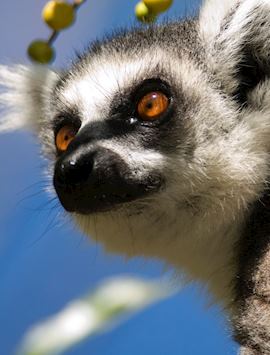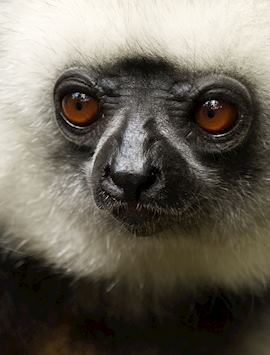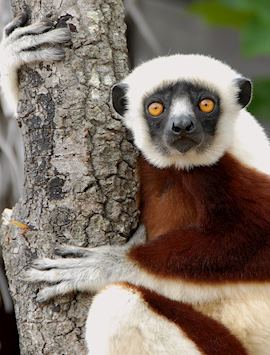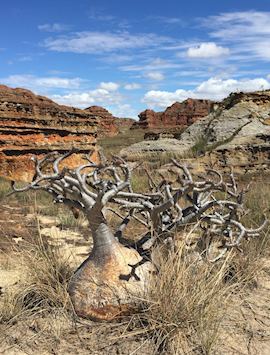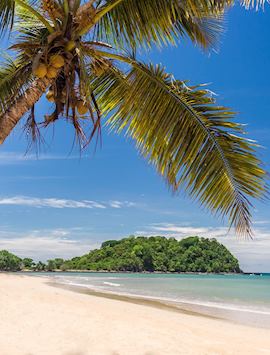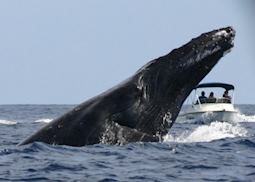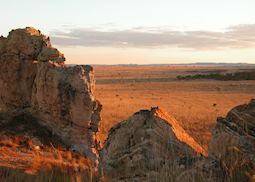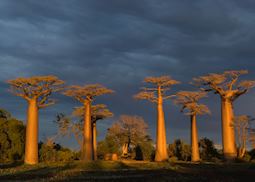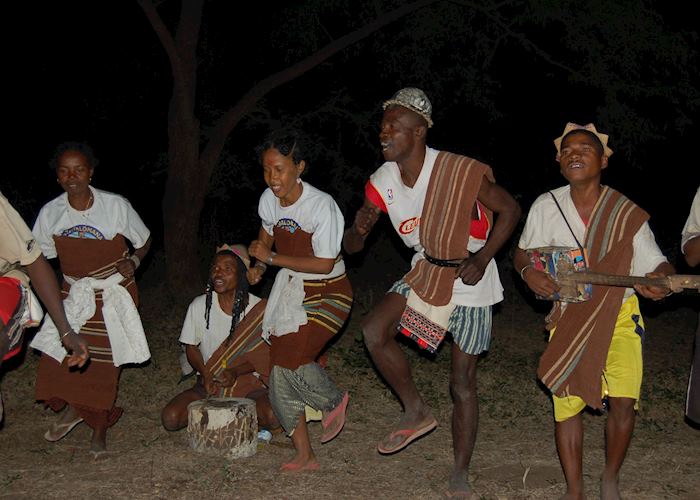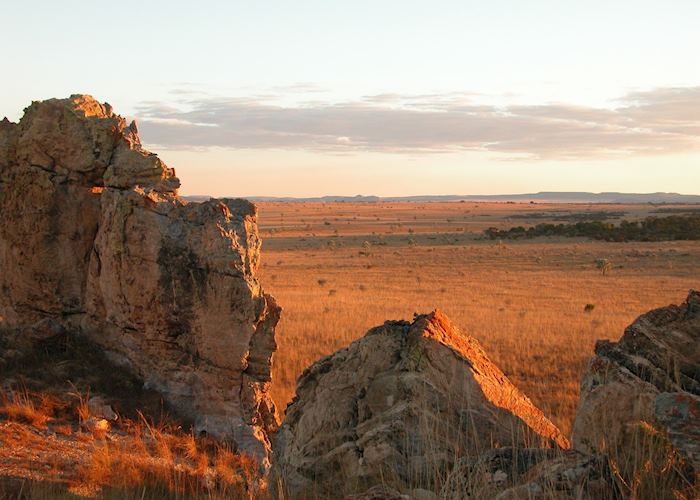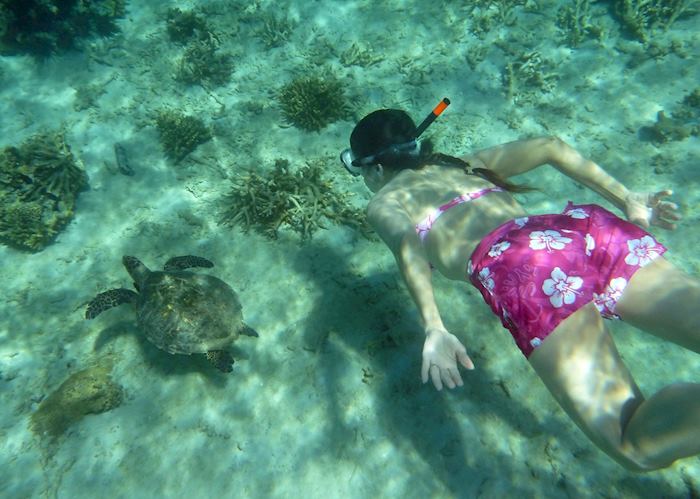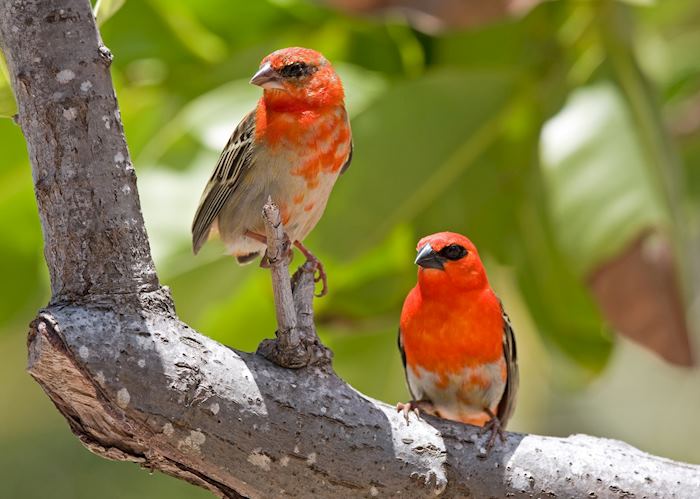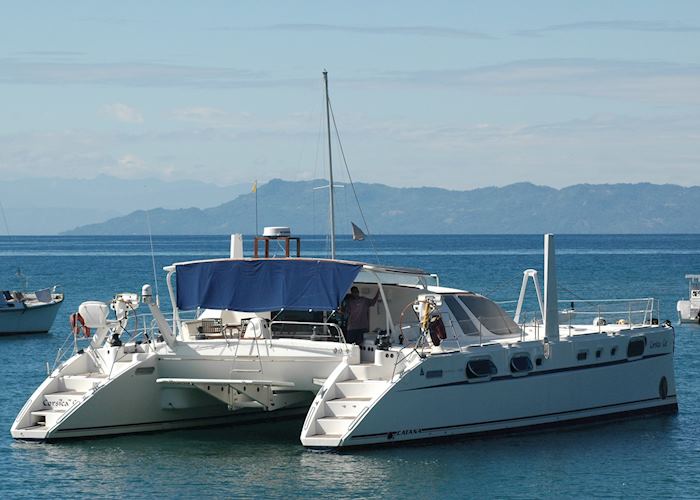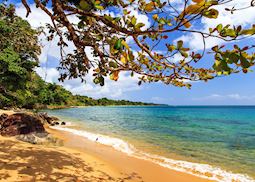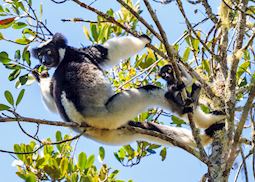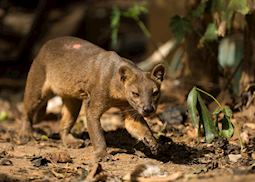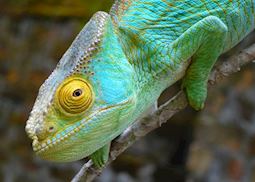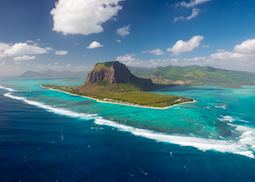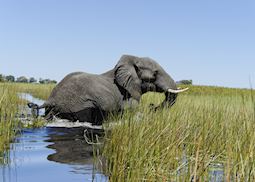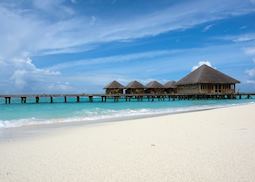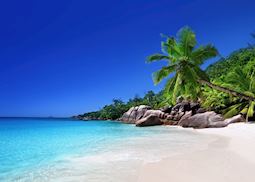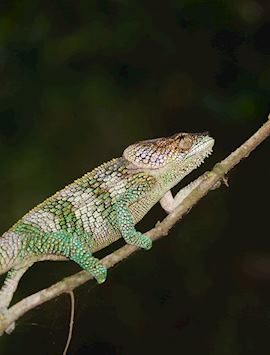
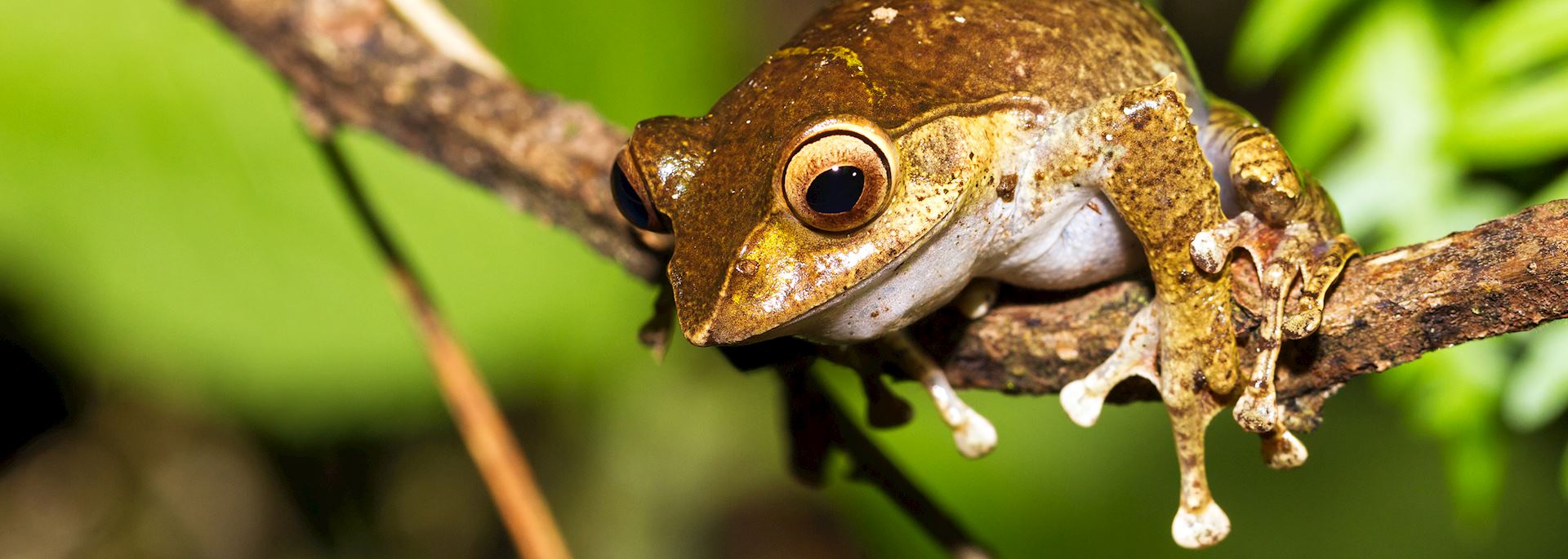
Tailor-made Madagascar holidays shaped around your passions
There’s no question that Madagascar’s main draw is its wildlife. Splitting off from the rest of the world millions of years ago, it evolved its own array of species that you’ll find nowhere else on Earth. After visiting this large island and exploring its habitats, our specialists have become captivated by its rich ecosystem. They’ll plan your holiday to Madagascar using their first-hand experiences.
Madagascar’s national parks and reserves ensure the protection of its unique inhabitants. Walking through deciduous forests and rainforests, you might hear the haunting call of an indri (the largest species of lemur), see a chameleon blending into its surroundings, or encounter the island’s only predator, the fox-like fossa. Our Madagascar specialists can also plan your trip around seeing migratory humpback whales, or so you can experience local culture with a riverboat cruise past tiny villages. An ocean cruise to Madagascar is a way to cover more ground. Step off your ship to walk among the twisty baobab forests and view lemurs in their natural habitat.
Suggested tours for Madagascar
These tours give you a starting point for what your holiday to Madagascar could entail. Treat them as inspiration, as each trip is created uniquely for you.
Suggested activities for Madagascar
Whatever your interests, our specialists will build activities into your trip that connect to how you want to experience Madagascar.
-
Whale watching in Ste Marie Channel ![Whale watching, Île Sainte-Marie, Madagascar]()
Whale watching in Ste Marie Channel
Île Sainte-MarieWhale watching in Ste Marie Channel
In June, humpback whales come from the waters of the South Pole to the Ste Marie Channel, not far off the coast. The channel is protected by the East coast of Madagascar and by Sainte-Marie, ideal for whales who come to breed and calve.
View details -
Hiking in Isalo National Park ![Isalo National Park, Madagascar]()
Hiking in Isalo National Park
Isalo National ParkHiking in Isalo National Park
Hiking in Isalo is superb. In the late afternoon your guide may suggest visiting the natural rock window to watch the sunset.
View details -
Moramba Bay boat trip ![Avenue of the Baobabs, Morondava]()
Moramba Bay boat trip
Anjajavy Private Nature ReserveMoramba Bay boat trip
The boat heads north up the coast which is deserted save one or two fishing villages and two private houses. The rest of the coastline is wild and untouched with beaches covered in ghost crabs, tiny coves with white sand, islands covered in lush vegetation and tall baobab trees and rocky outcrops where you may see the Madagascar fish eagle.
View details
Why travel with Audley?
- 100% tailor-made tours
- Fully protected travel
- Established for over 25 years
- 98% of our clients would recommend us
Best time to visit
Our specialists advise on the best months to visit Madagascar, including information about climate, events and festivals.
Request our brochure
Covering all seven continents, The World Your Way shows you how you can see the world with us. It features trip ideas from our specialists alongside hand-picked stays and experiences, and introduces our approach to creating meaningful travel experiences.
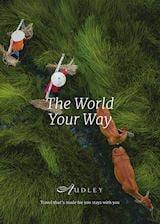
Useful information for planning your holiday in Madagascar
The official languages of Madagascar are Malagasy and French. Some English is spoken in hotels but it’s useful to have some French, and learning a few basic words of Malagasy will go a long way.
The currency in Madagascar is the Malagasy ariary (AR or MGA). You’ll find ATMs in cities and larger towns, but in rural areas you’ll need to pay in cash. Euros are widely accepted, and US dollars and pound sterling are easy to exchange.
ATMs don’t issue small denomination ariary so it’s also useful to carry euros for use in the bigger cities, saving your local currency for regional use.
In Madagascar, traditional dishes include ravitoto (crushed sweet cassava leaves with pork and garlic), romazava (local greens cooked with beef or zebu, tomato, and onion), and vary amin’ny anana (collard greens with onion, ginger, and tomato). Rice is a staple in Madagascar and served with almost every meal.
For something sweeter, try mofo gasy (Madagascan rice flour dumplings), a popular street food breakfast, or koba ravina (rice cake steamed in banana leaves).
Ranon’ampango (a tea made from burnt rice) is the traditional drink, and you’ll find spiced rum and local beer, THB, served everywhere.
In Madagascar, the standard tip in a restaurant is 5-10% of the total. Elsewhere, tipping is at your discretion and it’s worth asking locally about appropriate amounts if you’d like to tip guides or drivers, for example.
For the latest travel advice for Madagascar, including entry requirements, health information, and the safety and security situation, please refer to the Foreign, Commonwealth & Development Office website.
In Madagascar, you can see wildlife found nowhere else on Earth, hike through lush rainforest, visit marine parks, or relax on white-sand beaches. Steep cliffs, pristine jungle, and a wild coastline combine to make the scenery dramatic, while the absorbing culture is a product of the island’s rich history and relative isolation. Most of all though, Madagascar’s wildlife is the biggest draw.
You could combine time spotting wildlife in one of the national parks with a riverboat cruise to learn about local life, or a challenging hike though otherworldly rock formations. Alternatively, you could visit coastal marine parks on the untouched coastline, stroll along powdery beaches without seeing another soul, or relax by the pool with lemurs swinging in the trees above you.
In Madagascar, you can stay in beachfront boutique hotels, historic homesteads, rustic guesthouses, and small forest camps. In general, places to stay here tend to be more simple than in our other Africa destinations, but we’ve found the best hotels and most characterful guesthouses in the most popular places you’d visit.
For example, you could stay in a luxury tented camp at the foot of steep cliffs, an ecolodge on a forest-fringed bay, or in a historic boutique hotel. Along the coast, you could opt to stay in a simple stone rondavel, a wooden villa, or a private thatched lodge overlooking the beach.
For more ideas, browse our collection of places to stay in Madagascar.
Madagascar is an enormous island, and most visitors make their way to Masoala, Ranomafana, or Isalo national parks, Berenty Reserve, or the islands of Nosy Be and Ile Ste Marie. Most visitors arrive in the capital Antananarivo, then choose to explore either the north or the south of the island.
Masoala National Park is the island’s largest protected area, and its pristine rainforest and wild beaches offer absorbing trekking and wildlife viewing. Andasibe National Park is a great place to spot indri, the largest of Madagascar’s lemurs, while Ranomafana National Park is known for its golden bamboo lemurs.
You can hike through a cinematic landscape of jagged limestone karsts and needles in remote Tsingy de Bemaraha National Park, see towering baobab trees in Moramba Bay, and finish an island circuit with some time relaxing on the powdery sands of Ile Ste Marie or Nosy Be.
In Madagascar you’re likely to see a wide variety of lemurs, including sifakas, indris, ring-tailed lemurs, mouse lemurs, and aye-ayes, as well as fossa, chameleons, geckos, vivid frogs, and more than 285 bird species. Madagascar is megadiverse, and with the wildlife here evolving in isolation, about 80% of the species are found nowhere else on Earth.
The parks and reserves teem with lemurs swinging between the trees, civet, and mongooses rustle through the understory, and on closer inspection you’ll find bizarre-looking insects climbing tree trunks.
Of the nearly 300 bird species, 100 are endemic, including couas, vangas, and Madagascan red owls. Along the coast, you can spot humpback whales in waters home to 3,000 fish species, as well as manatees and dugongs. To learn more about what you might see and where you might find it, take a look at our guide to Madagascan wildlife.
It takes around 14 hours to fly from the UK to Madagascar.
The time zone in Madagascar is UTC+3 hours. Daylight Savings Time is not observed.
The best way to get around Madagascar is either by car or by plane. Generally, people tend to fly around the north and drive in the south. In northern Madagascar distances are huge and roads poor and for this reason it’s best to fly. Air Madagascar has a network of flights, all of which originate in Antananarivo and radiate to the major towns and islands.
You’ll be met at the airport by your guide with a 4x4 — or even a boat — ready to head off to parks, reserves, or private islands. We’ll provide a private vehicle and driver for all car journeys in the south, and if you’d like to explore the coastline, yacht charter is a surprisingly affordable option.
Use our travel tool to find up-to-date visa and passport requirements for madagascar. Enter where you’re travelling to and from (including any stopover destinations en route or flight layovers), along with your intended travel dates and passport details, for a full list of requirements.
Speak to your doctor about vaccine advice for Madagascar and ensure you’re up to date with the recommended vaccinations for your home country. You can also check the suggested vaccinations on the Travel Health Pro website.
Malaria is a risk throughout Madagascar. Speak to your doctor for advice about which antimalarial medication you should take.
The best way to reduce your risk of catching malaria is to avoid mosquito bites. Wear long, loose clothing that covers your arms and legs, apply a repellent with 50% DEET, and use a mosquito net if sleeping in an unscreened room. It’s best to take repellent with you in case there’s a local shortage.
Madagascar in pictures
Our expert guides to travelling in Madagascar
Written by our specialists from the viewpoint of their own travels, these guides will help you decide on the shape of your own trip to Madagascar. Aiming to inspire and inform, we share our recommendations for how to appreciate Madagascar at its best.
-
![Travelling to Madagascar]()
My travels in Madagascar
Our short video on Madagascar gives a flavour of what to expect in a country where plants and animals have evolved in relative isolation over millions of years.
-
Honeymoons in Madagascar ![Masoala Beach, Madagascar]()
Honeymoons in Madagascar
Honeymoons in Madagascar
Home to unique wildlife, dense rainforest and beautiful white sand beaches, Madagascar has something for the most discerning honeymooners. Add to this small, boutique hotels and great food, and your Audley tailor-made honeymoon to Madagascar won't disappoint.
Read this guide -
Family holidays in Madagascar ![Indri, Andasibe]()
Family holidays in Madagascar
Family holidays in Madagascar
Thanks to a DreamWorks film of the same name, Madagascar proves a popular choice for many children. As the animals found here are no threat to humans, you and your family are safe to explore the endless parks on foot, in search of local wildlife.
Read this guide -
Madagascar’s wildlife: A quirk of evolution ![Fossa, Madagascar]()
Madagascar’s wildlife: A quirk of evolution
Madagascar’s wildlife: A quirk of evolution
Madagascar’s forests shelter so many endemic wildlife species that visiting is like arriving on another planet. Following your guide through the trees, Indris cry overhead while chameleons lie perfectly camouflaged in the undergrowth. Africa specialist Andrew shares his wildlife experiences.
Read this guide -
What to do in Madagascar: our highlights guide ![Chameleon, Madagascar]()
What to do in Madagascar: our highlights guide
What to do in Madagascar: our highlights guide
On a Madagascar holiday you’ll see wildlife found nowhere else on Earth. Trek through rainforests teeming with lemurs, chameleons and exotic birds, swim and snorkel with marine life or explore the island’s culture on a riverboat cruise. Africa specialist James shares his ideas.
Read this guide
Other popular destinations
Still looking for ideas? If Madagascar has captured your interest, we think you might also like these destinations.


